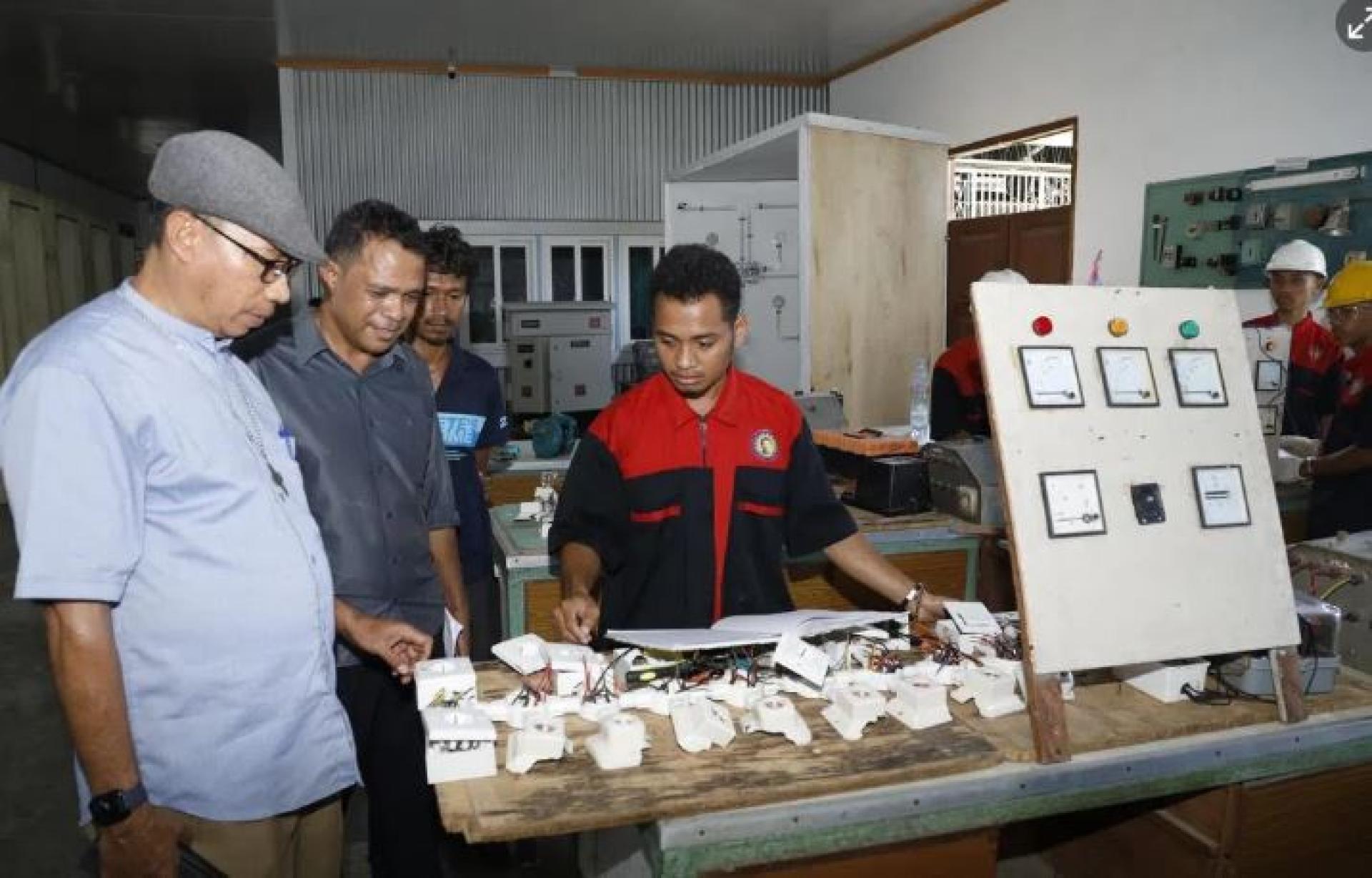(Singapore, 30th) A trip to Singapore gave the President of Timor-Leste’s Technical Institute, Jesus, a deep understanding of the urgency for vocational education reform and modernization.
Jesus, the President of Don Bosco Technical Institute of Timor-Leste, accompanied a Timor-Leste government study delegation in August last year to Singapore’s Institute of Technical Education (ITE) for a week-long training course, focusing on issues such as vocational education curriculum design, teacher training, and cooperation with industry.
In an interview with Lianhe Zaobao in Dili on the 13th of this month, he said that the most impressive word to him was “transformation.”
“We discussed how to improve vocational training centers, and how to shift from manual to digital methods. Timor-Leste must strive to move from traditional skills to modernization.”
On the 26th of this month, Timor-Leste officially joined ASEAN. To assist its capacity building efforts, Singapore has launched the “Singapore–Timor-Leste ASEAN Readiness Support (STARS) package” since 2022, sharing ASEAN experience and providing skills training and educational support. The study delegation Jesus joined was one of the initiatives under the program.
Jesus pointed out that Timor-Leste’s education system is still imperfect, and joining ASEAN now becomes an important opportunity for vocational education reform. Currently, local diplomas are not regionally recognized, limiting vocational school graduates in seeking employment abroad. He is now involved in updating the curriculum for Timor-Leste's workforce development agency to align it with the national accreditation framework, increasing graduate competitiveness.
“What I saw in Singapore made me realize the importance of curriculum development. If we don’t prepare our students now, it will be too late.”
There are a total of 53 public and private technical schools across Timor-Leste, with about 12,500 students and 700 teachers. Jesus admitted that vocational education requires significant government funding, but currently the government still does not give it enough emphasis.
Timor-Leste's Ministry of Education Technical School Administration Director Ximenes also visited Singapore with the delegation last year, and participated in the Singapore–Timor-Leste ASEAN Readiness Support “Training of Trainers” program again in February this year. He said these courses helped him manage school affairs in a more systematic manner, set clear priorities, and strengthen team spirit and communication.
This July, Singapore launched an enhanced version of the Singapore–Timor-Leste ASEAN Readiness Support package, further expanding the scope of technical assistance and flexibly adjusting according to Timor-Leste's needs. The new package also covers support for Timor-Leste’s accession to key ASEAN economic agreements.
Former Singapore Ambassador to Cambodia, Anderson, led Ministry of Foreign Affairs officials to visit Timor-Leste at the end of September and explained ASEAN mechanisms to local civil servants. He said he was deeply impressed by Timor-Leste officials’ eagerness to learn and positive attitude.
Anderson believes that although Timor-Leste faces greater challenges by joining ASEAN in today’s uncertain international environment, its proactive attitude and willingness to learn will be its driving force moving forward.
“They have a long way to go, but I believe they can rise to the challenge.”
In an interview with Lianhe Zaobao in Dili on the 13th of this month, he said that the most impressive word to him was “transformation.”
“We discussed how to improve vocational training centers, and how to shift from manual to digital methods. Timor-Leste must strive to move from traditional skills to modernization.”
On the 26th of this month, Timor-Leste officially joined ASEAN. To assist its capacity building efforts, Singapore has launched the “Singapore–Timor-Leste ASEAN Readiness Support (STARS) package” since 2022, sharing ASEAN experience and providing skills training and educational support. The study delegation Jesus joined was one of the initiatives under the program.
Jesus pointed out that Timor-Leste’s education system is still imperfect, and joining ASEAN now becomes an important opportunity for vocational education reform. Currently, local diplomas are not regionally recognized, limiting vocational school graduates in seeking employment abroad. He is now involved in updating the curriculum for Timor-Leste's workforce development agency to align it with the national accreditation framework, increasing graduate competitiveness.
“What I saw in Singapore made me realize the importance of curriculum development. If we don’t prepare our students now, it will be too late.”
There are a total of 53 public and private technical schools across Timor-Leste, with about 12,500 students and 700 teachers. Jesus admitted that vocational education requires significant government funding, but currently the government still does not give it enough emphasis.
Timor-Leste's Ministry of Education Technical School Administration Director Ximenes also visited Singapore with the delegation last year, and participated in the Singapore–Timor-Leste ASEAN Readiness Support “Training of Trainers” program again in February this year. He said these courses helped him manage school affairs in a more systematic manner, set clear priorities, and strengthen team spirit and communication.
This July, Singapore launched an enhanced version of the Singapore–Timor-Leste ASEAN Readiness Support package, further expanding the scope of technical assistance and flexibly adjusting according to Timor-Leste's needs. The new package also covers support for Timor-Leste’s accession to key ASEAN economic agreements.
Former Singapore Ambassador to Cambodia, Anderson, led Ministry of Foreign Affairs officials to visit Timor-Leste at the end of September and explained ASEAN mechanisms to local civil servants. He said he was deeply impressed by Timor-Leste officials’ eagerness to learn and positive attitude.
Anderson believes that although Timor-Leste faces greater challenges by joining ASEAN in today’s uncertain international environment, its proactive attitude and willingness to learn will be its driving force moving forward.
“They have a long way to go, but I believe they can rise to the challenge.”
